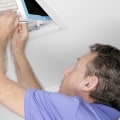Central heating or HVAC filters are designed to filter the air throughout the home. Portable air filters and HVAC filters can reduce indoor air pollutants, including viruses, that are transmitted through the air. In its most basic function, an air filter removes impurities such as dust, pet dander, or even bacteria from the air that flows through the system. Not only does this improve the air quality inside your home, but it also protects your HVAC system from potential damage.
Air filtration is often recommended as a component of environmental control practices for patients with allergic respiratory diseases. Studies support multiple interventions, including air filtration, as methods to improve outcomes in the treatment of allergic respiratory diseases. Residential air filtration can be provided by WHF through the home's HVAC system, the PRAC, or a combination of both. Devices have also been developed to filter the SBZ.
HVAC systems can create a reservoir for triggers if they are not well maintained. Economical, low-efficiency HVAC filters offer no better particle removal than any other filter. The WHF with high-efficiency HVAC filtration has been proven to be more effective at reducing particles than individual HEPA RACs. A study combining HVAC maintenance with a high-efficiency disposable MERV 12 HVAC filter has demonstrated the clinical benefit of WHF in asthma.
A PRAC HEPA study tends to yield clinical benefits, but its effectiveness is limited to a single room and not the entire home. Multiple rooms are needed to approach the benefit of high-efficiency WHF. Ionic electrostatic air cleaners provide little or no benefit compared to PRAC, WHF or HEPA. Ionic devices produce ozone, a respiratory irritant, and in a study caused an increase in submicron particles.
Three clinical studies demonstrated that SBZ filtration was effective. The best and most cost-effective approach may be to consider “combination filtration” using high-efficiency WHF with PRAC or breathing zone filtration in the bedroom. Most HVAC system air filters can only trap larger dust and dirt particles from the air. They are designed to keep the system running optimally and to reduce HVAC wear and tear, not to keep the indoor air perfectly clean.
Even so, HVAC filters certainly influence indoor air quality, and choosing the right filter is important. Portable air filters and HVAC filters can reduce indoor air pollution; however, they cannot remove all air pollutants. Some HVAC systems aren't strong enough to push air through more restrictive filters that block smaller particles, that is, those with a higher MERV or CADR rating, which can reduce airflow and cause your home to heat and cool less efficiently. The following publications provide information on portable air filters and heating and air conditioning filters that are commonly used in homes.
Let's take a closer look at how the HVAC air filter works, what an air purifier is, and how both are needed for optimal indoor air quality. Even reusable filters should be replaced when they show signs of wear and tear, keeping the air filter clean will ensure you get the best possible air quality in your home. We measure how well an air filter removes dust, pollen, and smoke from the air, and see how freely air flows through the filter at any fan speed. Whether you're trying to improve the air quality in your home for health reasons, or want to reduce energy and maintenance costs in your home, regularly cleaning or replacing your HVAC filter is an inexpensive and easy step in your home maintenance routine. Consult your HVAC system manual to determine the strength of your model or call an HVAC technician.
For millions of homes with forced air HVAC systems, regular maintenance programs and the use of high-efficiency disposable filters seem to be the best options. Finally, you'll need to consider the dimensions of the vents and spaces your HVAC system is repairing, which will determine the size and thickness of the filter you'll need. Proper maintenance of air filters, whether replacing or washing them regularly, is crucial not only to providing clean air in your home, but also to maintaining the proper functioning of your HVAC system. An HVAC air filter works to prevent dust, dirt, pollen, viruses, bacteria and contaminants from circulating throughout the house.
All Temperature Air recommends that you change your air filter regularly to keep your home and your HVAC system running smoothly. Permanent filters are more expensive upfront, but they can save you money in the long run because you can clean them instead of replacing them. If you have a heating and cooling system, then you already have an air filter that is part of your home's air conditioning, heating, or HVAC system. Or, thanks to today's smart home technology, you can even purchase smart filters such as 3M Filtrete smart air filters that use sensors to monitor airflow. Portable air filters and HVAC filters alone aren't enough to protect people from the virus that causes COVID-19; however they can help reduce indoor pollutants which can help improve overall health.


